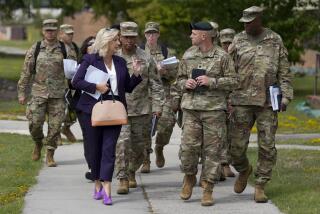Army Moves to Counter Risks Posed by AIDS
- Share via
The 19-year-old Army recruit was already in his third week of basic training when he began suffering a fever and headache. Eventually, large sores erupted over most of his body, and doctors traced them to the smallpox vaccination the young man had received a week or so before.
The recruit, apparently healthy when he enlisted early this year, had AIDS. His body, in the first stages of a disease that attacks the body’s immune system, was helpless to fend off even the mild virus contained in a vaccine routinely administered to children.
His case is typical of the kinds of problems the military faces in dealing with acquired immune deficiency syndrome, said William Mayer, assistant defense secretary for health affairs and chief architect of the armed services’ AIDS detection program.
Mayer, in Orange County this week for a convention of more than 7,000 military surgeons and other health professionals, said the Defense Department this month is launching its $20-million program to screen 2.1 million service personnel because of the health risk that soldiers face more than any other segment of the population.
‘Conventionally Cautious’
“We’re trying to behave in a conventionally cautious, medically sound way,” Mayer said Wednesday. “But we have first of all a responsibility to the people of the country to make sure their defense establishment is hale and hearty and able to defend us.”
AIDS is a major source of concern to the armed services because of the need to vaccinate soldiers traveling to disease-plagued parts of the world and the military’s frequent reliance on direct, “buddy-to-buddy” blood transfusions during combat or other emergencies, Mayer said.
“If somebody bombs an airline terminal in Frankfurt and we have 200 people injured, we need blood and we need it right away,” Mayer said. “You can’t use a guy who’s had a positive test for AIDS. To take his blood and directly transfer it into somebody else would guarantee that he would be infected.”
So far, the military has had 108 confirmed cases of AIDS--about the same ratio as the general population--but the methods of transmission have differed markedly in some respects.
For example, while only 1% of the AIDS victims nationwide were exposed to the disease through heterosexual contact (most contract it through homosexual relations), about 30% of the military’s AIDS cases have been traced to heterosexual activity. In the Army, 70% of all AIDS cases are heterosexual, said Tansill Johnson of the Army surgeon general’s office.
“Scientifically, we really have no way to prove why that should be,” Mayer said. Researchers have found a relatively high incidence of AIDS among prostitutes in Europe, he said, “and the military does, of course, have a relatively larger segment of people away from home who are more likely to be exposed to outside sexual contact.”
The issue of homosexual transmission has been controversial for the military. As a matter of longstanding policy, homosexuals are prohibited from serving in any branch of the armed forces.
While Defense Department spokesmen have said in recent weeks that a positive AIDS test traced to homosexual activity would not result in an automatic dismissal from the armed services, Mayer said that homosexuals who “flaunt” promiscuous sexual activity probably would be discharged, though under honorable conditions.
“There will probably never be a specific cookbook list” of who will and will not be subject to discharge, however, Mayer said.
Enlistees who actually suffer from the disease--a relatively small proportion of those who have been exposed to the virus--will be medically discharged from the service and eligible for tax-paid health care for the rest of their lives. Mayer said he estimates that the typical cost of care for a terminal AIDS patient might run as high as $100,000.
Others who test positive for the virus but who show no active symptoms will be examined and returned to duty and re-examined at least once a year, Mayer said.
“One of the things we really have to be cautious about is not to unduly alarm the public because there are always going to be a certain amount of people who become alarmed enough and who are going to want Draconian, drastic measures,” Mayer said.
“Our national history is such that we’re really not comfortable as a society with sexually transmitted diseases,” he said. “Here’s a disease that seems to be venereal, that seems to be connected not with what most people consider normal love, but a great many people truly, sincerely believe to be some kind of sin, and it seems invariably fatal. You add all those things together, and we have a phenomenon in our hands that has potentially explosive social consequences.
“We don’t want panic in our armed forces.”
More to Read
Sign up for Essential California
The most important California stories and recommendations in your inbox every morning.
You may occasionally receive promotional content from the Los Angeles Times.










